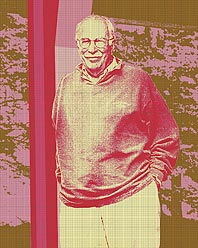
Roger Angell’s new book, Let Me Finish, is a memoir by way of essays. In it he vividly, heartbreakingly traces 86 years as a New Yorker and nearly as many working at The New Yorker. Chris Smith spoke with him about his influences—and the influence he’s had on writers from Woody Allen to John Updike.
As the son of Katherine Sergeant White, a longtime editor at The New Yorker, and as the stepson of E. B. White, you started your cultural education very early.
I lived mostly with my older sister and my father, Ernest Angell, on East 93rd Street. He was a lawyer, but he was good company, and he attracted lively friends, like Walter Lippmann, the playwright
Whom did you like to read back then?
My favorite authors included Conan Doyle, Dickens, Will James on cowboys, Joseph A. Altsheler on Indians, and Dr. Raymond L. Ditmars on reptiles. I read a lot of Conrad; I loved all that sea stuff, all the gloom. I’ve read everything. When I was, oh, about 12 or 13, The New Yorker had been going for about seven, eight years. I said one day at lunch that I knew the caption on every New Yorker cartoon that had ever been published. And my mother and Andy said, “Oh, come on.” So they got out some old issues—and I did.
From the chapter titled “Andy,” it seems that White’s greatest lesson to you was about determination.
I observed him writing, and I saw how hard it was, how it took all day to write these light, two-column “Comment” pieces for The New Yorker every week. He’d suffer, and the typewriter would go silent, and he’d be all morning in his study. He’d come out and have lunch and wouldn’t say anything. At the end of the day, he’d mail it off and say, “It isn’t good enough.”
Did White ever talk to you about writing?
Oh, no, he would never do that. Never, never. No. Nobody was priming me to be a writer, and I wasn’t priming myself to be a writer.
You describe your own style as a fiction editor as a “taker-outer.”
Less is probably better. Young writers think that what they’ve written is for the ages. When Woody Allen started writing here, he could do better S. J. Perelman than Perelman. I told him, “We already have one of these.” Somebody like Updike keeps editing himself all the way through. My job with Updike is to keep that process happening.
How do you think you shaped twentieth-century American fiction?
I’m sure I haven’t. Fiction is shaped by fiction writers. You wait for the next writer to come along who is influential. Alice Munro and William Trevor and John Updike are the great figureheads of short-story writing and have been for some time. I don’t think there’s been a single young writer who has influenced people in recent years. It will happen. Someone will come along, and suddenly everyone will shift over and begin writing like that. It happened with Salinger, it happened with Ann Beattie, it happened with Raymond Carver.
There are plenty of young writers imitating Dave Eggers.
Yeah [pantomimes zipping his lips].
How did you start writing about baseball?
[William] Shawn wanted to get more sports into the magazine. I told him about spring training; he didn’t know there was such a thing. It was 1962. In those days, old people went to spring training, so I wrote about the old people in the stands and the young guys out on the field. Also, that was the first year of the Mets, which was a great story for me, because I could report that from the stands. I wasn’t sure enough of myself to go into the press box or talk to the players. People used to laugh at me because my World Series pieces came so late, sometimes after Thanksgiving. Shawn didn’t have a sense of deadline. [David] Remnick now wants it next week, which is fine. It’s that sort of a magazine, and I try to oblige. Shawn thought, Everybody knows what the news is; now tell us something else about it. I was called the poet laureate of baseball for a long time, which is a compliment, I guess. But this isn’t poetry. It’s reporting.
What are you reading?
Trollope’s Framley Parsonage. At 3:30 last night, I was reading a passage and I had a moment of being intensely grateful to Trollope. That sounds very pretentious.
Your new book also describes your long love affair with the movies.
I snuck off to the movies two or three times a week, for two or three years, from school, instead of going to gym, when I was in my early teens. My father never found out. This was the beginning of Hollywood’s golden age, and I saw some great stuff: King Kong, Scarface, the Marx Brothers, The Public Enemy. I memorized all the character actors. The movies taught me a great deal about storytelling and drama. I don’t know what exactly, but it was such a powerful medium. I’m a big believer in popular culture. I know people who say they don’t have a television. You better belong to the times that you’re in.
Let Me Finish
Harcourt, 320 pages